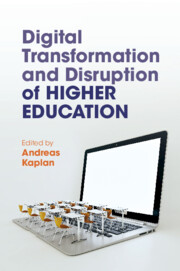Book contents
- Digital Transformation and Disruption of Higher Education
- Digital Transformation and Disruption of Higher Education
- Copyright page
- Contents
- Figures
- Tables
- Contributors
- Preface
- Chapter 1 Nothing Is Constant Except Change
- Part I (R)evolution of the Higher Education Sector
- Part II Changes in Teaching Formats
- Part III Changes in Teaching Content
- Part IV Networking and Social Activities
- Part V Certification and Diplomas
- Part VI Careers and Professionalisation
- Chapter 23 About University Career Services’ Interaction with EdTech
- Chapter 24 About Training Educators to Become Drivers for Change
- Chapter 25 About Instructors’ Readiness to Teach Online
- Chapter 26 About Precarious Faculty and Their Digital Disruption
- Part VII Futuristic and Ultramodern Higher Education
- Part VIII Higher Education in Motion
- Editor’s Biography
- Index
- References
Chapter 24 - About Training Educators to Become Drivers for Change
from Part VI - Careers and Professionalisation
Published online by Cambridge University Press: 09 June 2022
- Digital Transformation and Disruption of Higher Education
- Digital Transformation and Disruption of Higher Education
- Copyright page
- Contents
- Figures
- Tables
- Contributors
- Preface
- Chapter 1 Nothing Is Constant Except Change
- Part I (R)evolution of the Higher Education Sector
- Part II Changes in Teaching Formats
- Part III Changes in Teaching Content
- Part IV Networking and Social Activities
- Part V Certification and Diplomas
- Part VI Careers and Professionalisation
- Chapter 23 About University Career Services’ Interaction with EdTech
- Chapter 24 About Training Educators to Become Drivers for Change
- Chapter 25 About Instructors’ Readiness to Teach Online
- Chapter 26 About Precarious Faculty and Their Digital Disruption
- Part VII Futuristic and Ultramodern Higher Education
- Part VIII Higher Education in Motion
- Editor’s Biography
- Index
- References
Summary
Despite the increasing need to respond to changes in society and work, Higher Education (HE) remains slow to innovate and adapt (Serdyukov, 2017). The traditional model of education which was developed for a uniform, elite cohort, excludes many individuals. To realise the value of education in a modern society we need to consider Innovative and inclusive approaches to learning which can be enabled by digital technologies. This requires educators to re-examine their role and how they can influence change within current, rigid HE structures. Higher Education Institutes (HEIs) are in unusual circumstances in that academic staff have significant influence over change (Armstrong 2014). This can be advantageous as encouraging an innovative mind-set at individual levels of the organization can potentially lead to significant impact (Serdyukov, 2017; Jakovljevic, 2018). This chapter will explore barriers to innovation in HE, and the role of educators in enabling digital transformation. It will discuss a transformative Faculty Development model aimed at nurturing educators as agents for change in a digital age.
- Type
- Chapter
- Information
- Digital Transformation and Disruption of Higher Education , pp. 316 - 332Publisher: Cambridge University PressPrint publication year: 2022
References
- 1
- Cited by

